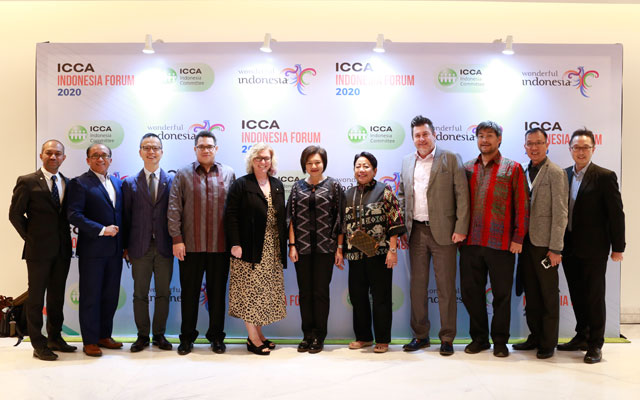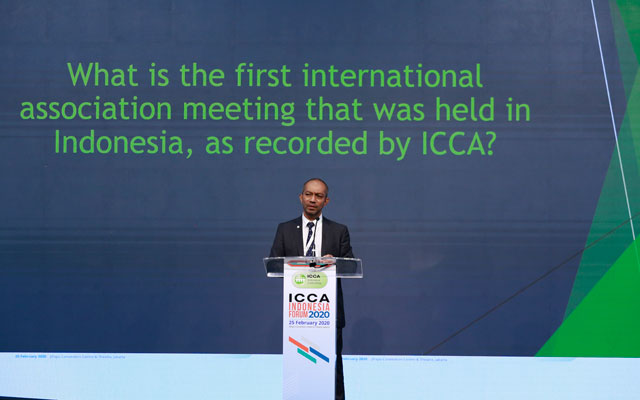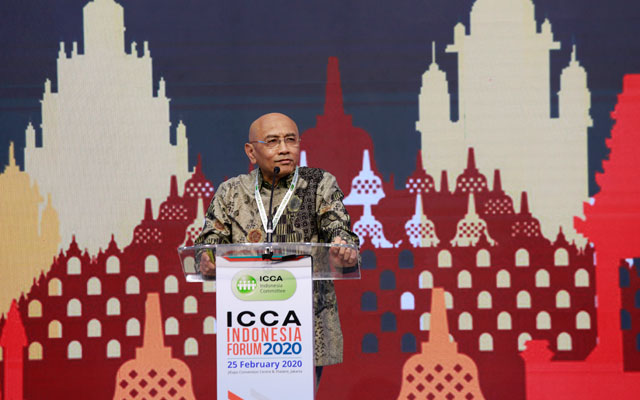Indonesia has the opportunity to rise and become one of Asia-Pacific’s top business events destinations, but stakeholders have a lot of catching up to do, said speakers at the inaugural ICCA Indonesia Forum in Jakarta.
One reason for this is because association meetings have drifted away from Europe to Asia-Pacific and are chances that Indonesia can capitalise on. In addition, Indonesia has several industry-leading sectors that international business events are interested in.
Raty Ning, chairman of ICCA Indonesia Committee, said: “(The fact that) more international events are held in Asia-Pacific, while at home, (the government) is now giving more focus to business events sector, is good momentum for Indonesia, which still sits below Malaysia, Thailand and Singapore, in attracting association events.”
Jason Yeh, ICCA’s vice president and chair of Asia-Pacific chapter, added: “The government is in the industrial revolution. With Indonesia 4.0, there is a focus on factory and technology…. (which is where the opportunities for attracting events lie).”
Yeh pointed to leading sectors in Indonesia such as F&B, coffee production, textile and apparel had related international events the country could tap into. “In the automotive industry, for example, there is the International Conference on Automation and Electrical Engineering,” Yeh pointed out.
However, there are challenges the country’s business meetings industry has to overcome.
Aman Pulungan, president of Asia Pacific Pediatric Association and president of the Indonesian Pediatric Society, elaborated: “There are many health societies and associations here. The opportunity is there and the market is big, but it is tricky to host an event in Indonesia. For example, Jakarta was flooded on my way (to this event), and it took me two hours to get here.”
This is as he shared in his address that there were numerous meetings, conferences and symposiums within the pediatric society. In Indonesia alone, there were 26 chapters with an event taking place almost every week, where participants ranged from hundreds to 4,000 when there is a national congress.
Other issues that Aman pointed out were the difficult in obtaining safety guarantees, or assurance from local governments.
For example, two years ago when his association was planning to host a conference in Bali, an earthquake struck Lombok. “We could not get any safety guarantees from anyone to help us decide whether we should continue or postpone. I had to go to Lombok myself to assess the situation, report back, and convince participants the event could carry on.”
“Guarantee and assurance from the government are important as cancelling an event costs (host and organiser) a lot of money,” he noted.
Other issues Aman pointed out include the need for convention centres in appointed business centres
Connectivity is also an issue. Aman elaborated: “I am not just talking about international direct access. Even people in Kalimantan don’t have direct access between cities on the island. Participants from (Balikpapan in East Kalimantan, for example) have to fly to Jakarta to connect to a flight to Banjarmasin in South Kalimantan. This doesn’t make sense!”
He encouraged stakeholders to share all this with the local government, so that it can be “acted upon” and the business will not be wasted.
Meanwhile, Noor Ahmad Hamid, ICCA’s regional director, touched on the importance of being able for the private sector to collaborate with the government, and “speak the same language” so that the goals. are aligned.
He shared: “You cannot do things without government support. If you are bringing 4,000 to 5,000 delegates you have to take them through the immigration counter. Who owns it? The government, so there needs to be collaboration. “
For instance, Noor pointed out the chief minister in Sarawak fully supports business events, hence the convention bureau is funded by the government, while the chief minister ensures that all ministries support the bureau, and understand that business events are not part of the tourism sector.
“Business events are part of the knowledge economy. Every time the bureau goes out for a bid, the respective ministry will give their full support, making it easier for the bureau to bid,” said Noor.
Noor also pointed to using data to help with the bidding process. For example, Japan has many city convention bureaus and to compete internationally, they make use of data to differentiate themselves.
“Kobe, being the K supercomputer city – the fastest computer after China and the US – will bid for events relevant to their city. When talking about snow, (bids) will go to Sapporo, while (education-related subjects) are (channelled) to Sendai as it has the universities with the highest population of international students,” he elaborated
He also suggested that Indonesia create a strategy to develop second- and third-tier cities.
“Not all associations have the funding to go to big cities. Going to the second-, or third-tier cities will also bring benefit. A conference with 400 delegates is small for Jakarta but to Batam and Palembang, you have the whole town for yourselves. That’s the dynamic of an international conference,” he said.
























